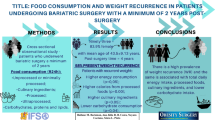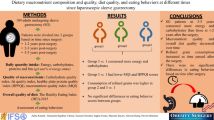Abstract
Purpose
Dietary intake and food preferences change after bariatric surgery, secondary to gastrointestinal symptoms and dietitian counseling. The aim of this study was to evaluate the changes in the frequency intake of different foods in patients undergoing sleeve gastrectomy and following a strict dietary control.
Patients and Methods
A prospective observational study of all the morbidly obese patients undergoing laparoscopic sleeve gastrectomy as bariatric procedure between 2007 and 2012 was performed. Dietary assessment was performed using the Alimentary Frequency Questionnaire 1991–2002, developed and validated by the Department of Epidemiology of Miguel Hernandez University (Elche, Alicante Spain).
Results
Ninety-three patients were included for analysis, 73 females and 20 males, with a mean preoperative BMI of 46.4 ± 7.9 kg/m2. One year after surgery, excess weight loss was 81.1 ± 8.3% and 5 years after surgery, 79.9 ± 6.4%. Total weight loss at 1 year was 38.8 ± 5.3% and at 5 years, 35.4 ± 4.9%. Postoperatively, a reduction in the intake of dairy products, red meat, deli meat products, shellfish, fried potatoes, sweets, rice, pasta, beer, and processed foods was observed. Vegetables, fruits, and legumes intake increased after surgery. In the first postoperative year, there was a slight intolerance to red meat, fruits, vegetables and legumes, dairy products, pasta, and rice that mostly disappeared 5 years after surgery.
Conclusion
One year after sleeve gastrectomy, calibrated with a 50-French bougie, there are not important problems in the intake of foods a priori difficult to digest. These problems mostly disappeared 5 years after surgery. The decrease intake of other unhealthy foods is mostly based on the dietary counseling.
Similar content being viewed by others
References
Molin Neto BD, Earthman CP, Farias G, et al. Eating patterns and food choice as determinant of weight loss and improve of metabolic profile after RYGB. Nutrition. 2016;28:1050–5.
World Heallth Organization (WHO). Obesity and overweight. Key facts. 20015. http://www.who.int/mediacentre/factsheets/fs311/en/index.html.
Souza Ade M, Bezerra IN, Cunha DB, et al. Evaluation of food intake markers in the Brazilian surveillance system for chronic diseases – VIGITEL 2007-2009. Rev Bras Epidemiol. 2011;14:44–52.
Bezerra IN, Goldman J, Rhodes DG, et al. Differences in adult food group intake by sex, and age groups comparing Brazil and United States nationwide surveys. Nutr J. 2014;21:13–74.
Freire RH, Borges MC, Alvarez-Leite JI, et al. Food quality, physical activity and nutritional follow-up as determinant of weight regain after Roux-en-Y gastric bypass. Nutrition. 2012;28(1):53–8. https://doi.org/10.1016/j.nut.2011.01.011.
Fontana MA, Wohlgemuth SD. The surgical treatment of metabolic disease and morbid obesity. Gastroenterol Clin N Am. 2010;39(1):125–33. https://doi.org/10.1016/j.gtc.2009.12.010.
Brethauer SA, Hammel JP, Schauer PR. Systematic review of sleeve gastrectomy as staging and primary bariatric procedure. Surg Obes Relat Dis. 2009;5(4):469–75. https://doi.org/10.1016/j.soard.2009.05.011.
Himpens J, Dobbeleir J, Peeters G. Long-term results of laparoscopic sleeve gastrectomy for obesity. Ann Surg. 2010;252(2):319–24. https://doi.org/10.1097/SLA.0b013e3181e90b31.
El Labban S, Safadi B, Olabi A. The effect of Roux-en-Y gastric bypass and sleeve gastrectomy surgery on dietary intake, food preferences, and gastrointestinal symptoms in post-surgical morbidly obese Lebanese subjects: a cross-sectional pilot study. Obes Surg. 2015;25(12):2393–9. https://doi.org/10.1007/s11695-015-1713-8.
Le Roux CW, Bueter M. The physiology of altered eating behavior after Roux-en-Y gastric bypass. Exp Physisol. 2014;9:1128–32.
Coluzzi I, Raparelli L, Guarnacci L, et al. Food intake and changes in eating behavior after laparoscopic sleeve gastrectomy. Obes Surg. 2016;26(9):2059–67. https://doi.org/10.1007/s11695-015-2043-6.
Faria SL, de Oliveira KE, Lins RD, et al. Nutritional management of weight regain after bariatric surgery. Obes Surg. 2010;20(2):135–9. https://doi.org/10.1007/s11695-008-9610-z.
Sarwer DB, Dilks RJ, West-Smith L. Dietary intake and eating behavior after bariatric surgery: threats to weight loss maintenance and strategies for success. Surg Obes Relat Dis. 2011;7(5):644–51. https://doi.org/10.1016/j.soard.2011.06.016.
Kafri N, Valfer R, Nativ O, et al. Health behavior, food tolerance and satisfaction after laparoscopic sleeve gastrectomy. Surg Obes Relat Dis. 2011;7(1):82–8. https://doi.org/10.1016/j.soard.2010.09.016.
Sioka E, Tzovaras G, Oikonomou K, et al. Influence of eating profile on the outcomo of laparoscopic sleeve gastrectomy. Obes Surg. 2013;23(4):501–8. https://doi.org/10.1007/s11695-012-0831-9.
Schweiger C, Weiss R, Keidar A. Effect of different bariatric operations on food tolerance and quality of eating. Obes Surg. 2010;20(10):1393–9. https://doi.org/10.1007/s11695-010-0233-9.
Overs S, Freeman R, Zarshena N, et al. Good tolerance and gastrointestinal quality of life-following three bariatric procedures: adjustable gastric banding, Roux-en-Y gastric bypass and sleeve gastrectomy. Obes Surg. 2012;22(4):536–43. https://doi.org/10.1007/s11695-011-0573-0.
Bavaresco M, Paganini S, Lima TP, et al. Nutritional course of patients submitted to bariatric surgery. Obes Surg. 2010;20(6):716–21. https://doi.org/10.1007/s11695-008-9721-6.
Author information
Authors and Affiliations
Ethics declarations
Conflict of Interest
The authors declare that they have no conflict of interest.
Informed Consent
Informed consent was obtained from all individual participants included in the study.
Statement of Human Rights
All procedures performed in this study were in accordance with the ethical standards of the institutional research committee and with the 1964 Helsinki declaration and its later amendments.
Rights and permissions
About this article
Cite this article
Ruiz-Tovar, J., Bozhychko, M., Del-Campo, J.M. et al. Changes in Frequency Intake of Foods in Patients Undergoing Sleeve Gastrectomy and Following a Strict Dietary Control. OBES SURG 28, 1659–1664 (2018). https://doi.org/10.1007/s11695-017-3072-0
Published:
Issue Date:
DOI: https://doi.org/10.1007/s11695-017-3072-0




